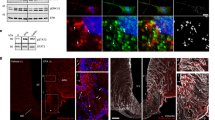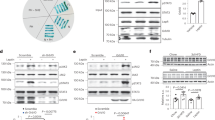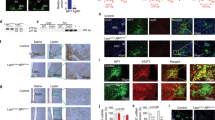Abstract
Adiponectin (ADP) is an adipocyte hormone involved in glucose and lipid metabolism. We detected a rise in ADP in cerebrospinal fluid after intravenous (i.v.) injection, consistent with brain transport. In contrast to leptin, intracerebroventricular (i.c.v.) administration of ADP decreased body weight mainly by stimulating energy expenditure. Full-length ADP, mutant ADP with Cys39 replaced with serine, and globular ADP were effective, whereas the collagenous tail fragment was not. Lepob/ob mice were especially sensitive to i.c.v. and systemic ADP, which resulted in increased thermogenesis, weight loss and reduction in serum glucose and lipid levels. ADP also potentiated the effect of leptin on thermogenesis and lipid levels. While both hormones increased expression of hypothalamic corticotropin-releasing hormone (CRH), ADP had no substantial effect on other neuropeptide targets of leptin. In addition, ADP induced distinct Fos immunoreactivity. Agouti (Ay/a) mice did not respond to ADP or leptin, indicating the melanocortin pathway may be a common target. These results show that ADP has unique central effects on energy homeostasis.
This is a preview of subscription content, access via your institution
Access options
Subscribe to this journal
Receive 12 print issues and online access
$209.00 per year
only $17.42 per issue
Buy this article
- Purchase on Springer Link
- Instant access to full article PDF
Prices may be subject to local taxes which are calculated during checkout




Similar content being viewed by others
References
Ahima, R.S. & Flier, J.S. Adipose tissue as an endocrine organ. Trends Endocrinol. Metab. 11, 327–332 (2000).
Friedman, J.M. & Halaas, J.L. Leptin and the regulation of body weight in mammals. Nature 395, 763–770 (1998).
Elmquist, J.K., Elias, C.F. & Saper, C.B. From lesions to leptin: hypothalamic control of food intake and body weight. Neuron 22, 221–232 (1999).
Tsao, T.S., Lodish, H.F. & Fruebis J. ACRP30, a new hormone controlling fat and glucose metabolism. Eur. J. Pharmacol. 440, 213–221 (2002).
Pajvani, U.B. et al. Structure-function studies of the adipocyte-secreted hormone Acrp30/adiponectin. Implications for metabolic regulation and bioactivity. J. Biol. Chem. 278, 9073–9085 (2003).
Yamauchi, T. et al. The fat-derived hormone adiponectin reverses insulin resistance associated with both lipoatrophy and obesity. Nat. Med. 7, 941–946 (2001).
Berg, A.H. et al. The adipocyte-secreted protein Acrp30 enhances hepatic insulin action. Nat. Med. 7, 947–953 (2001).
Yamauchi, T. et al. Globular adiponectin protected ob/ob mice from diabetes and ApoE-deficient mice from atherosclerosis. J. Biol. Chem. 278, 2461–2468 (2002).
Kubota, N. et al. Disruption of adiponectin causes insulin resistance and neointimal formation. J. Biol. Chem. 277, 25863–25866 (2002).
Maeda, N. et al. Diet-induced insulin resistance in mice lacking adiponectin/aCRP30. Nat. Med. 8, 731–737 (2002).
Combs, T.P. et al. Sexual differentiation, pregnancy, calorie restriction, and aging affect the adipocyte-specific secretory protein adiponectin. Diabetes 52, 268–276 (2003).
Yamauchi, T. et al. Adiponectin stimulates glucose utilization and fatty-acid oxidation by activating AMP-activated protein kinase. Nat. Med. 8, 1288–1295 (2002).
Fruebis, J. et al. Proteolytic cleavage product of 30-kDa adipocyte complement-related protein increases fatty acid oxidation in muscle and causes weight loss in mice. Proc. Natl. Acad. Sci. USA 98, 2005–2010 (2001).
Elias, C.F. et al. Chemical characterization of leptin-activated neurons in the rat brain. J. Comp. Neurol. 423, 261–281 (2000).
Masaki, T. et al. Corticotropin-releasing hormone-mediated pathway of leptin to regulate feeding, adiposity, and uncoupling protein expression in mice. Endocrinology 144, 3547–3554 (2003).
Dinulescu, D.M. & Cone, R.D. Agouti and agouti-related protein: analogies and contrasts. J. Biol. Chem. 275, 6695–6698 (2000).
Ste Marie, L. et al. A metabolic defect promotes obesity in mice lacking melanocortin-4 receptors. Proc. Natl. Acad Sci. USA 97, 12339–12344 (2000).
Butler, A.A. et al. A unique metabolic syndrome causes obesity in the melanocortin-3 receptor-deficient mouse. Endocrinology 141, 3518–3521 (2000).
Masaki, T. et al. Peripheral, but not central, administration of adiponectin reduces visceral adiposity and upregulates the expression of uncoupling protein in agouti yellow (Ay/a) obese mice. Diabetes 52, 2266–2273 (2003).
Yamauchi, T. et al. Cloning of adiponectin receptors that mediate antidiabetic metabolic effects. Nature 423, 762–769 (2003).
Combs, T.P. et al. A transgenic mouse with a deletion in the collagenous domain of adiponectin displays elevated circulating adiponectin and improved insulin sensitivity. Endocrinology 145, 367–383 (2003).
Ahima, R.S. et al. Appetite suppression and weight reduction by a centrally active aminosterol. Diabetes 51, 2099–2104 (2002).
Nagy, T.R. & Clair, A.L. Precision and accuracy of dual-energy X-ray absorptiometry for determining in vivo body composition of mice. Obes. Res. 8, 392–398 (2000).
Ahima, R.S. & Hileman, S.M. Postnatal regulation of hypothalamic neuropeptide expression by leptin: implications for energy balance and body weight regulation. Regul. Pept. 92, 1–7 (2000).
Paxinos, G. & Franklin, K.B.J. in The Mouse Brain in Stereotaxic Coordinates 36–47 (Academic Press, New York, 1997).
Acknowledgements
These studies were supported by National Institutes of Health grants RO1-DK62348 (to R.S.A.) and R01-DK55758 (to P.E.S.), Medical Scientist Training Grant T32-GM07288 (to U.B.P.) and an American Diabetes Medical Scientist Training Grant (to A.H.B.). Technical expertise for mouse studies was provided by the Penn Diabetes Center Mouse Phenotyping Core (funded by National Institutes of Health grant P30-DK19525). We thank N. Llanza for RT-PCR analysis.
Author information
Authors and Affiliations
Corresponding author
Ethics declarations
Competing interests
The authors declare no competing financial interests.
Rights and permissions
About this article
Cite this article
Qi, Y., Takahashi, N., Hileman, S. et al. Adiponectin acts in the brain to decrease body weight. Nat Med 10, 524–529 (2004). https://doi.org/10.1038/nm1029
Received:
Accepted:
Published:
Issue Date:
DOI: https://doi.org/10.1038/nm1029
This article is cited by
-
Elevated circulating adiponectin levels do not prevent anxiety-like behavior in a PCOS-like mouse model
Scientific Reports (2024)
-
Factors related to hypermetabolism in individuals with type 2 diabetes mellitus and non-alcoholic fatty liver disease
Scientific Reports (2023)
-
Metabotropic glutamate receptor 5 knockout rescues obesity phenotype in a mouse model of Huntington’s disease
Scientific Reports (2022)
-
Association of ADIPOQ-rs2241766 and FTO-rs9939609 genetic variants with body mass index trajectory in women of reproductive age over 6 years of follow-up: the PREDI study
European Journal of Clinical Nutrition (2022)
-
Kisspeptins and Glucose Homeostasis in Pregnancy: Implications for Gestational Diabetes Mellitus—a Review Article
Reproductive Sciences (2022)



